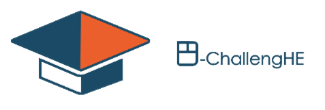

This Guide is developed within the WP5 of the Erasmus+ project ”Digital Challenge in Higher Education” (2022-1-IT02-KA220-HED-000087029).
Chapter 3 Digital technologies for active learning
3.3. Accessibility and inclusion: Universal design for learning
3.3. Accessibility and inclusion: Universal design for learning
Originating from neurocognitive science, the concept of "universal design for learning" (UDL) has gradually gained traction in the field of education. Recognizing the unique nature of each student, instead of imposing a one-size-fits-all solution for the entire class, we should offer a variety of learning experiences tailored to individual needs, thereby maximizing the potential for progress (Istrate, 2018).
The purpose of the universal design is to design a learning activity in order to:
The universal design approach encourages educators to thoughtfully consider learning activities that genuinely support students in a particular class to engage with and master the instructional content being presented:
Computer-assisted learning aligns well with universal design principles, as this concept has been largely influenced and driven by the educational possibilities offered by emerging technologies. We've moved past the era of limited teaching resources and rigid curricula. Today, educators have access to a wide array of complementary tools, including online applications, educational software, digital resources across various disciplines, and virtual learning platforms. These can be readily incorporated into the classroom, allowing teachers to provide students with options that best suit their individual levels, abilities, and aspirations. This approach enables a more personalized and inclusive learning experience, in line with the core tenets of universal design in education.
» Provide feedback for this chapter: https://forms.gle/tNyWC1HYMsP46t6WA
« Get back to main page: digital-pedagogy.eu/Guidelines
An open access guide. A perfectible product, for an evolving reality.
You can use the form available on this page to provide feedback and/ or suggestions.
For social annotations on any chapter, you can use Hypothesis or any other similar tool.
You can also send direct feedback to: olimpius.istrate@iEdu.ro | +40 722 458 000
Guidelines for online and blended learning
Available online: https://digital-pedagogy.eu/Guidelines
Full pdf version to download: Guidelines (version 6)
The Romanian partner in D-ChallengHE project in charge with WP5 is
the Institute for Education (Bucharest): https://iEdu.ro
Contact: office@iEdu.ro